Human Desire (1954)
Directed by: Fritz Lang
Written by: Alfred Hayes, Émile Zola
Starring: Broderick Crawford, Edgar Buchanan, Glenn Ford, Gloria Grahame
USA
AVAILABLE ON DUAL FORMAT BLU-RAY AND DVD: NOW, from EUREKA ENTERTAINMENT
RUNNING TIME: 91 mins
REVIEWED BY: Dr Lenera, Official HCF Critic
Jeff Warren returns home to his railroad engineer’s job after serving his time in Korea. The supervisor is Carl Buckley, an alcoholic who beats his wife Vicky, until he’s fired for insubordination. Desperate to get his job back, he gets Vicki to talk to powerful businessman John Owens on his behalf, but when he thinks that she used sexual favours to do so, he murders him on a train journey. Also on the train is Jeff, and sparks fly between him and Vicki when Carl sends her to get Jeff out of the way so he can leave John’s room unseen. He and Vicki fall for each other, but then Carl blackmails Vicky with a letter into staying with him for as long as they’ll live….
It’s one of the most familiar set-ups in crime fiction. A love triangle between a guy, a femme fatale and her husband that tends to eventually involve a plot to kill the husband. It formed the basis of possibly the best film noir ever, Double Indemnity, and it’s formed the basis of countless movies since, not all of them noir. You can probably partly explain the femme fatale as being based on a male fear of female sexuality, and you can probably partly explain the popularity of the character type as a male reaction against the short lived independence of many women during World War 2, but the premise was re-used for decades later, and Human Desire is based on a novel from 1890, though when it came out it may have initially seemed like something of a rehash. However, this film, the latest addition to Arrow’s impressive array of Fritz Lang titles on Dual Format, provides some interesting variations on the premise, and really puts the viewer through a mental workout as we keep getting our opinion of its main female character changed over and over again. Even at the end, we’re not sure about her, and a lot of things concerning her. While the film is effectively cold, bleak and tough much like a lot of Lang’s other work, it’s perhaps most worth watching for Gloria Grahame, who probably does her very best work in it, making the most of her character’s ambiguities yet also delivering a memorable portrayal of a damaged woman who is still able to manipulate – or is that really what she’s doing?
This was actually the third film based on La Bete Humaine by Emile Zola. The first version, the German Die Bestie im Menschen, dates from 1920, though it’s the 1938 adaptation from Jean Renoir in 1938 which is by far the better regarded and more famous film. It was Paramount head Jerry Ward who was a fan of La Bete Humaine and who wanted a remake, though screenwriter Alfred Hays certainly couldn’t adapt it that closely – a main protagonist who became a murderer when alone with a woman, and him committing suicide at the end – would not have sat well with 1954 censors. Lang didn’t like the new title, finding it redundant and reportedly saying “what other kind of desire is there?”. He offered the role of Jeff to Marlon Brando, who turned it down saying “I cannot believe that the man who gave us the über dark Mabuse, the pathetic child murderer in M and the futuristic look at society, Metropolis, would stoop to hustling such crap.”. Rita Hayworth turned down the Vicki part because, being embroiled in a court case, she couldn’t leave the United States for Alberta, Canada, where filming was intended to take place, while Peter Lorre refused to play Carl because Lang had treated him badly on the set of M. In the end the film reunited Lang with his The Big Heat stars Glenn Ford and Gloria Grahame, and location work was done at El Reno, Oklahoma, instead. It was fairly well received, though many claimed the French version was better, a film that I’m now going to have to see. There was two further versions: La Bestia humana from Argentina in 1957, and the BBC’s Cruel Train in 1995.
It was while writing up a review of Horror Express a few weeks ago that I realised how much I liked train movies, and Human Desire can virtually be classed as one, seeing as much of it, including the two most important events, takes place during various train journeys. Of course the idea of a vehicle heading towards a definite destination is an appropriate metaphor for the fatalism of film noir, but this one really makes the most of it, the camera often strapped to the front of the train as it hurtles along, twice seen entering tunnels. This viewpoint even opens the film, set to a good main title music piece as a romantic theme plays over rhythms mimicking the movement of a train while the orchestra makes train-like noises, as returning Korean War vet Jeff Warren arrives with his old train driver workmate Alec to tell his boss that he’s back. Back living as a boarder in Alec’s house, he has an admirer in Alec’s daughter Ellen. Jeff seems reasonably keen – until he meets Vicki, introduced to us lying down on her bed, with her legs up in the air, so sexy and inviting. It’s enough to even make the Pope feel weak at the knees. Her husband is gruff, a heavy drinker, and prone to lashing out at Vicki when he feels jealous. From his point of view, he has good reason to feel this way after Vicki doesn’t return from almost five hours after her meeting with John, which gets Carl his job back. Vicki tells both Carl and Jeff – and us – that nothing sexual happened, but I think that one is still inclined to wonder. Seeing Carl lose his rag has a real vicious charge to it and later we’re told that Vicki often confesses to cheating after being beaten even if she’s lying. We get a rather convincing snapshot of an abusive relationship.
Carl forces Vicki to write a short letter to John, setting up a meeting with him in his train compartment where he stabs him to death. This happens behind a door, but the casual ease with which he wipes the blood off the knife onto his clothes, disturbs. Has he done this before? Carl takes Owens’s wallet and his pocket watch to make the murder appear to be one done in the course of a robbery, and keeps the letter as insurance against Vicki’s going to the police. There’s an immediate attraction when she and Jeff meet for the first time, kissing within minutes, though neither Grahame nor Ford share much chemistry – but this could be intentional, seeing how the world of this film is one in which desire signifies only fear, jealousy and hatred. There’s a telling moment when Jeff kisses Vicki and is virtually yanking her hair with both hands as he’s doing so. It’s hardly affectionate, but then also take note of Jeff’s reaction to being shown her bruises from being beaten by her husband. It’s rather different from how you or I would probably react. They may have drastically toned down the character, but I still wouldn’t say that he’s a nice guy. In fact this film is brave enough to give us some scenes where it seems possible that Jeff, who never knows whether to believe Vicki or not, may behave in a manner to her like that of Carl, which really gets us thinking. As for Vicki, we just don’t know what to think, but she seems to me to be genuine in some of her more vulnerable moments. You get the sense that she’s been always treated like dirt by guys so it’s almost understandable that she’ll take any opportunity to even the score. But she remains something of a mystery. I reckon that something else that’s a mystery to some is the ending, which, after one of the film’s relationships reaches its logical conclusion, comes along awfully abruptly. But in a way there’s a somewhat satisfying, blase cynicism about it – which is of course quite appropriate.
The screenplay has some great lines [“6.30 – if you’re single it’s early, if you’re married it’s late”]. It’s possible that some may feel that the proceedings rely a little too much on talk, and sometimes Danielle Amfitheatrof’s rather omnipresent music is required to provide some edge, but Lang’s beginnings in silent cinema allows him to frequently show, rather than tell, crucial pieces of information, like the way the two beds of our married couple are initially shown pushed together, but when we see the room later, the beds are now apart. There’s good use of foreshadowing, from Carl whittling with his knife to one of Vicki’s friends talking to Carl about having had relationships with several men which sets up the feelings that consume him later. Jeff talking about his war experiences is nicely done because we have to decide for ourselves whether they had a positive or negative effect on him [I think the latter]. And I’m sure the way that characters are often beside very precise lines is deliberate, Lang’s fascination with fatalism being given symbolic visual strength, though there are perhaps too many stock shots of train tracks. The cinematography by Burnett Guffey [who by coincidence also lensed My Name Is Julia Ross and So Dark The Night which I reviewed last week] initially goes easy on the shadows, black partially covering faces and the like, and a drab grey is the predominate colour, but as Jeff gets more and more embroiled in dangerous intrigue things look more and more stylish, and sometimes even theatrical, like when light from one room shines into another and forms what looks like a path, and when Jeff and Vicki are in a rail yard shack and are briefly illuminated by a train light, showing that when you try to hide, you may actually be right in the spotlight!
What’s rather disappointing is Ford’s mediocre performance which is just not intense enough and seems too offhand for me, though some may say that works for the character. At least Broderick Crawford makes for a convincing drunk [love his walk] and is sometimes not just frightening but is even sympathetic in a few spots. And of course Graham, who somehow has a knack for being seductive and vulnerable in the same scene, is magnificent. You may never work her character out, but you’ll never feel that she’s not playing a rounded human being despite the cliched saxophone-led music theme that accompanies her. A grim, even gloomy but quite compulsive tale of people who bring about their own demise through a series of tragic misunderstandings, Human Desire gets to the heart of what Lang was all about more as much as his better known and more celebrated work, even it to me it didn’t always flow too well. He believes that love is actually not the solution to everything and the force that makes one overcome every obstacle, but is actually ugly, confusing and the prime source of trouble. Yet despite all this seeming nihilism, he does usually care about his characters [note, for example, the way the camera lingers on Ellen at one point far more than you might think]. And maybe, despite my earlier comments, I wonder now if the ending isn’t quite as cynical as all that, as a pair of dance tickets suggests that there’s hope for at least some of us humans.
Rating: 









This is Human Desire‘s first release on Blu-ray. There’s some stock footage train stuff which understandably doesn’t look too good, but the many very black-dominated shots tend to be fine, with nice crisp blacks – though I do recommend that you view this one with the lights off! Grain is sometimes a bit unevenly managed, but overall this still looks pretty good for a film from 1954 and I doubt that fans of the film would be disappointed with the restoration. Special features are limited to 19 minutes of Tony Rayns talking about the film in what is one of Eureka’s thinner releases, though it seems that no DVDs of the film contained any extras so there was nothing to port over. Rayns is on good form, going into detail about the book and film La Bete Humaine, the production [apparently it was really hard getting a train company on board because of the two murders in the film], Hayes, and the response. Even though he sometimes tends to ramble, he doesn’t really do so here, and anyway I’m getting to rather like the unrehearsed nature of his analyses.
Though not quite top-grade Lang, Human Desire is still an interesting, quite layered film noir with an incredible turn from its female star. Recommended.
DUAL FORMAT SPECIAL FEATURES
*1080p presentation on Blu-ray (with a progressive encode on the DVD)
*LPCM Mono audio
*Optional English SDH subtitles
*A new and exclusive interview with film historian Tony Rayns
*PLUS: A 40-PAGE collector’s booklet featuring new writing on the film by film historian Travis Crawford, critic and author Richard Combs, and writer Adam Batty, alongside rare archival imagery.

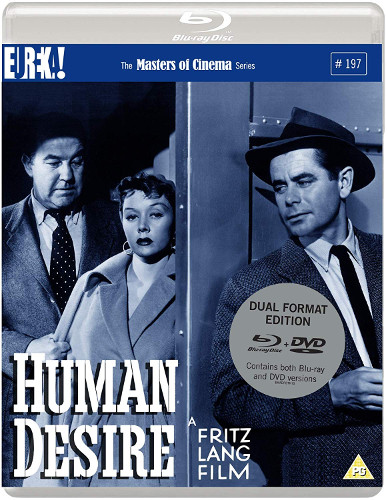
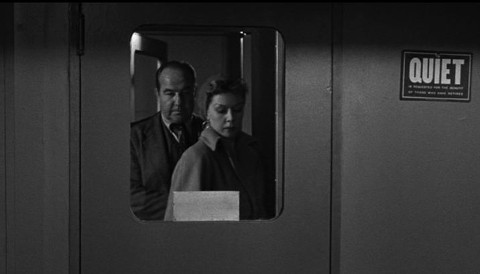
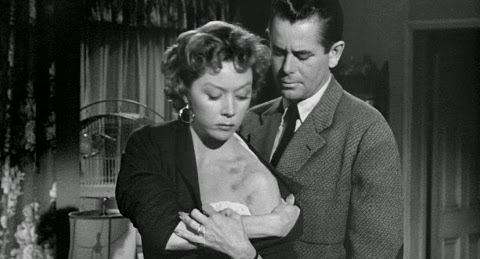

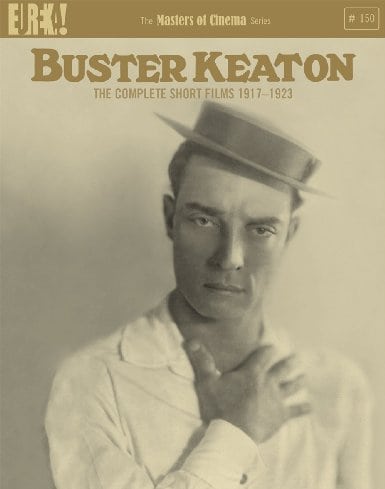
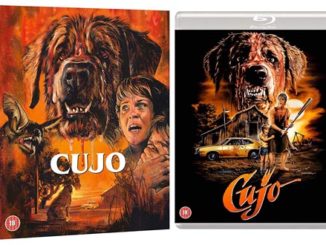
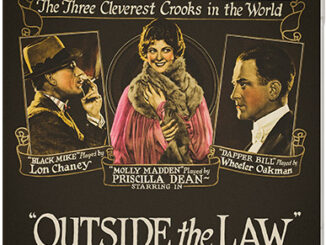
Be the first to comment